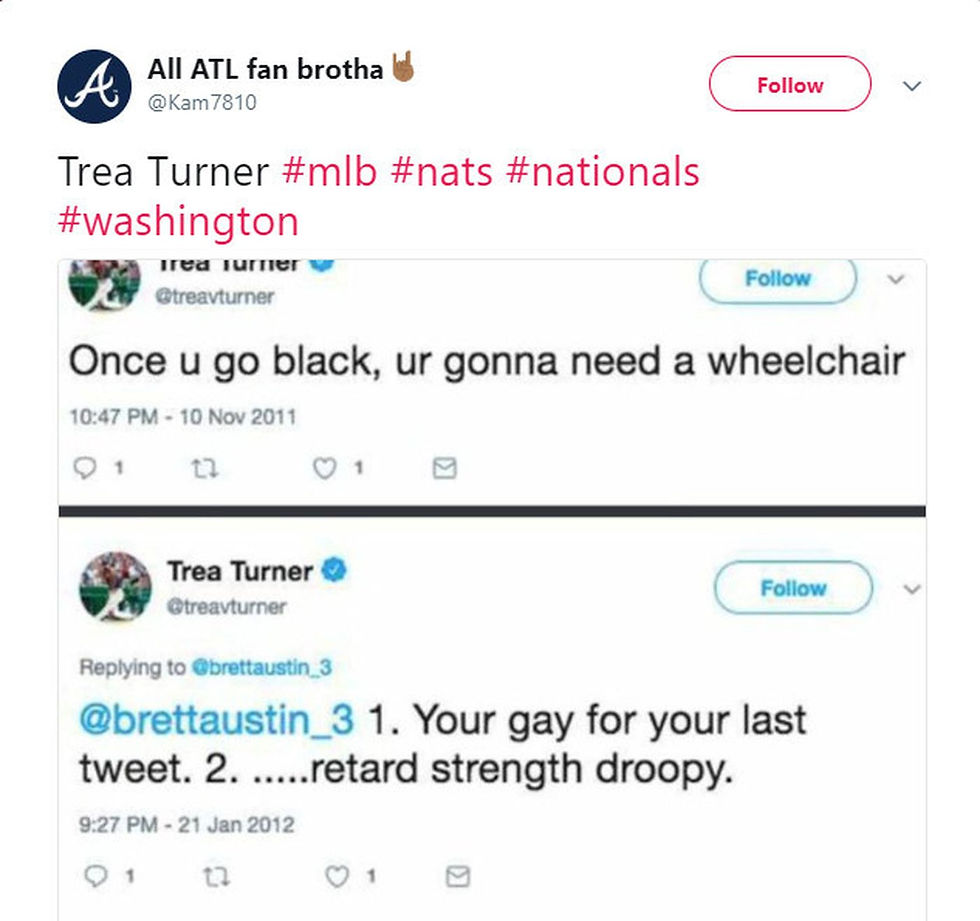
Don’t tweet stupid stuff. Seems like no-brainer advice, doesn’t it? Yet, if one's brain is not fully-functional (we’ll get to that in a minute), following this simple guideline is harder than it seems.
Case(s) in point… In the past few weeks, the offensive tweets of three Major League Baseball players came back to bite each of them in very public and embarrassing ways. In each case, the racist and homophobic tweets now causing their P.R. nightmares were posted when each athlete was still in high school:
Milwaukee Brewers’ Josh Hader’s teenage Twitter history shows a string a messages filled with racist, homophobic and misogynist sentiments.
Atlanta Braves pitcher Sean Newcomb’s offensive teenage tweets include a racial epithet that was part of a rap lyric, and several others that include gay slurs.
Washington Nationals shortstop Trea Turner’s embarrassing tweets, posted when he was 18-years-old, include anti-gay comments and a joke with racist undertones.

While these tweets speak volumes about each athlete’s (albeit, still under development) character, lots of people are asking if it is fair to judge each man by his adolescent posts. But that’s the wrong question, because fair or not, we live in a world where each of us is judged by what we post online.
They Were Educationally-Disadvantaged

I’m guessing these athletes didn’t benefit from digital literacy lessons in school. Had they been one of my Cyber Civics students they would have participated in a “digital background check” lesson in sixth grade, well before they started tweeting dumb stuff.
During this activity students pretend to be college admissions officers tasked with the job of deciding who to award a full athletic scholarship to. They make their decision based upon a careful review of each candidate’s (fictional) digital reputation (a collection of everything that person had posted and that others had posted about that person online).
This lesson thrusts students into the proverbial driver’s seat, because when you’re about to cruise the Information Superhighway, it’s important to know how to drive.
Digital literacy lessons benefit teenage brains still under construction. Sure, even after lessons like the one described above, some kids still post stupid stuff. But often a more clear-headed classmate (who also participated in the lesson) will see or hear about the offending tweet and warn their classmate of its stupidity. How do I know this? I’ve seen it happen time and again. Peers are much more effective digital mentors than parents.
When It Comes To Tweeting, Teenagers Have a Brain Deficit

Now, getting back to the brain. Aside from the fact that each of these tweets were, at the very least, mean-spirited, these men were not only educationally-disadvantaged, they were biologically disadvantaged too.
Recent advances in brain imaging reveal that certain parts of the brain are not fully functional until about age twenty-five. One of the last areas of the brain to fully mature is the prefrontal cortex, which is largely responsible for rational thought and good judgment, two capacities that come in handy when using social media. Without a fully developed prefrontal cortex, teens process information with their amygdala, or their emotions, and that makes them more likely to:
Act on impulse
Misread or misinterpret social and emotional cues
Engage in dangerous or risky behavior.1
For example, although a teenager might understand the possible consequences of posting a stupid tweet, the part of his brain that should be warning, “Hey, hold on a minute—better not post this one,” isn’t fully operational yet. So guess what happens? The unfortunate tweet gets posted, shared, and might come back to haunt him later, as in the cases of these MLB players.
The only silver lining to the latest of a long string of stupid tweets that come back to haunt tweeters later, is that these unfortunate events shed light on the importance of teaching kids to be smart online. Perhaps we should thank these MLB players for their very public service--reminding us of our collective failure...neglecting to teach the first generation of digital kids that there can be serious offline consequences, even years later, for their online actions.
1. American Academy of Child and Adolescent Psychiatry, “The Teen Brain: Behavior, Problem Solving and Decision Making,” Facts for Families, no. 95 (September 2016). Retrieved on December 29, 2017 from https://www.aacap.org/App_Themes/AACAP/docs/facts_for_families/95_the_teen_brain_behavior_problem_solving_and_decision_making.pdf.
Written By: Diana Graber and partially excerpted from her forthcoming book "Raising Humans in a Digital World: Helping Kids Build a Healthy Relationship With Technology" (HarperCollins Leadership/December 2018).





















